#Teacher Development
Explore tagged Tumblr posts
Text

Coming up this weekend I’ll be giving a GIS workshop to teachers
2 notes
·
View notes
Text
[🇹🇭/🇺🇸] สมดุลอำนาจ: บทเรียนการปฏิรูปการศึกษาไทยจากกรณีสหรัฐฯ (Power Balance: Thai Education Reform Lessons from the US Case)
การวิเคราะห์การปรับโครงสร้างกระทรวงศึกษาธิการ: เปรียบเทียบและแนะนำสำหรับประเทศไทย การเปรียบเทียบไทย สหรัฐฯ และแนวทางทั่วโลก โครงสร้างของไทยในปัจจุบัน ระบบการศึกษาไทยรวมศูนย์ภายใต้กระทรวงศึกษาธิการ ซึ่งดูแลนโยบาย หลักสูตร การจัดการครู และทรัพยากร ระบบนี้มีปัญหาความเหลื่อมล้ำระหว่างโรงเรียนในเมืองกับชน��ท หลักสูตรที่ขาดความยืดหยุ่น และระบบราชการที่ไม่มีประสิทธิภาพ แนวทางของสหรัฐฯ สหรัฐฯ…
#นโยบายการศึกษา#ปฏิรูปการศึกษา#พัฒนาครู#สมดุลการศึกษา#อนาคตเด็กไทย#แนวทางใหม่#โรงเรียนไทย#Balanced Approach#EdTech#Education Reform#Future Of Learning#Innovation#Policy Change#School Autonomy#Teacher Development#Thai Education
0 notes
Text
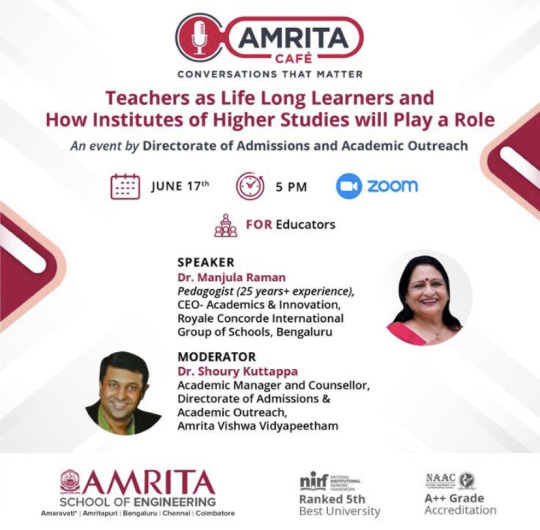
The "Teachers as Life Long Learners and How Institutes of Higher Studies Will Play a Role" event, moderated by Dr. Shoury Kuttappa, was a resounding success. Held by the Directorate of Admissions and Academic Outreach at Amrita School of Engineering, this engaging event gathered educators eager to explore continuous learning and the evolving role of higher education in professional growth.
Dr. Shoury Kuttappa facilitated an insightful discussion with Dr. Manjula Raman, emphasizing lifelong learning, professional development, and educational leadership.
youtube
#empowering teachers#indian education#teacher development#life long learning#higher education#DrShouryKuttappa#future of education#Youtube
0 notes
Text
Empowering Cambodian Educators: Advancing Digital Professional Development

Strategic Gathering of Digital Education Stakeholders
Digital education stakeholders in Cambodia convened to strategize for the second phase of the UNICEF Digital Education program. This initiative, funded by the Capacity Development Partnership Fund Phase III, aims to enhance continuous professional development (CPD) for teachers, teacher educators, and educational staff throughout the country.
Ongoing Support and Expansion Plans
With ongoing support from UNICEF and the Cambodian government's dedication to elevating teacher skills, the digital CPD platform will be expanded over the next three years. The goal is to ensure its long-term viability as a crucial resource for educators.
Assessing Existing Platforms
In the first phase of the program, we focused on evaluating existing CPD platforms to provide strategic guidance to the Ministry of Education, Youth, and Sports. This involved conducting a national landscape assessment to identify effective digital learning interventions for teachers and students. The insights gained led to the creation of a Capacity Development Platform (CDP), an integrated online platform designed for the continuous professional development of teachers and teacher educators.
Features of the Capacity Development Platform
The CDP offers evidence-based resources to enhance educators’ skills in subject-specific instruction, active learning methodologies, classroom management, and remediation techniques. Currently, the platform serves over 2,600 educators, providing access to more than 20 courses, including early-grade reading, math, mentoring, and career counseling. It has gained traction among five government departments, such as those focusing on primary education and digital transformation.
Principles of Human-Centered Design
The development of the digital CPD platform adheres to human-centered and user-focused design principles, ensuring that technology is used in an accessible, equitable, and responsible manner.
Governance Structure for Phase Two
Phase two will involve establishing a governance group comprising representatives from various Ministry of Education departments and formulating a governance strategy. This will facilitate continuous collaboration and resource allocation. The expansion will include surveying partners to evaluate existing courses and identifying opportunities to convert in-person courses into blended or fully online formats.
Commitment to Collaboration
At the program inception meeting, World Education engaged with representatives from multiple government departments and teacher education institutes to outline core activities, work plans, success metrics, and risk mitigation strategies. Participants demonstrated a strong commitment to working together on this vital initiative.
Looking Ahead
We are eager to support government priorities, improve the quality of education in schools nationwide, and build upon the existing framework for sustainable digital learning in Cambodia.
0 notes
Text
Educational Thought Leadership: How to Drive Innovation and Shape the Future of Learning
Ready to shape the future of education? Dive into our latest post on educational thought leadership. Discover how innovation, technology, and visionary thinking can drive meaningful change in classrooms and beyond.
Educational Thought Leadership In today’s rapidly evolving world, education must continually adapt to meet the changing needs of society, advances in technology, and shifting perspectives on how people learn. At the heart of this transformation is thought leadership, a driving force shaping the future of education. Thought leaders challenge conventional practices, spark innovation, and inspire…
#AI in education#Aotearoa#Classroom Technology#Edtech#Education innovation#education reform#educational thought leadership#Equity in Education#Future of Learning#Graeme Smith#Inclusive Education#LEARNING STRATEGIES#Lifelong learning#New Zealand#pedagogy#school leadership#student engagement#teacher development#thisisgraeme
0 notes
Text




have some sympathy, Davrin, a tragedy has occurred 😔
HOWEVER, I think they would be repressing so much stress during veilguard that stepping on a snail in that moment would become kind of the last straw. not talking from personal experience at all
yayy oc rambling
anyway, i think Zea normally wouldn't like. cry about accidentally killing a little creature like a snail. Like, they would be sad, but you know, cest la vie, the mere fact of existing brings with it many small accidental deaths that we just have to come to terms with, if we notice them at all.
#kunst huli#zea dao oc#dragon age#davrin dragon age#datv davrin#neve gallus#datv#dragon age veilguard#dragon age: the veilguard#rook datv#rook thorne#blood tw#just in casies#im lying i AM talking from personal experience.#but in my case it was two snails n i ended up crying in front of my furniture restoration teacher 🧍♂️#ANYWAYS#i love like. thinking about what a....unique moral compass zea would develop bcs of their inherent kindness but also proximity to noel#while growing up#and lora frankly. i dont think she would be that much different from noel in her approach dflkgjfd#stabbing someone to death? 🤷♂️ kill or be killed baby#accidentally killing a bug? theyre going to be tormented by that for the rest of the week#there is much more i could say abt the whole thing. but its is 2 am and so i shan't
776 notes
·
View notes
Text
Guide Talks Recording - Teacher Development
Jennie DeGroat and Naatosi Fish discuss methods teachers can use to plan curricula and develop lesson plans to improve their language teaching methods
0 notes
Text
katsuki financially backing the development of the support gear that allowed izuku to be a hero again... him reaching out his hand to izuku once the support gear's complete and telling him to "come on!" bc he knows the one thing izuku wanted to be was a hero... i moved
#mha spoilers#mha 430#bnha spoilers#bnha 430#bakudeku#textpost#ari posting#was following the leaks on twt and i didn't rlly gaf until the very end where this happened#i'm lying a little bit i really like that izuku became a teacher at ua after the war#and that uraraka developed a quirk counseling program#(seemingly to honor toga bc i've seen ppl point out that she went to quirk counseling and the program she went to sucked ass)#(so uraraka working to develop a better type of program had me emo)#but those moments really.... ahhhhh it started w them and it ended w them
2K notes
·
View notes
Text
Genuinely I think we as a society need to figure out why 90% of the population is unbelievably bad at math and hates it like why have we demonized truly one of the most important subjects in school
#obligatory “i don't hate people with discalcula and that's also not what I'm talking about”#and i am genuinely a bit upset about this because i truly don’t get it. like math is hard but not THAT much harder than english#or learning a language#and you can't ALL have had super shitty math teachers#so why are so many people incapable of doing like basic algebra#“oh math isn't applicable to real life” yeah man i bet you're forced to read various classics and talk about them later all the time huh#maybe not everything you learn in school DIRECTLY translates to real life hm? maybe you're developing your brain to be able to think?#and don't get me started on “gays can't do math” hey worstie why are you correlating being queer with anti intellectualism#math#education
152 notes
·
View notes
Note
Hello. Sorry if this a stupid question u can ignore if u want.
How can someone get better at media analysis? Besides obviously reading a lot.
Im asking this bc im in a point where im aware of my own lack of tools to analyze stories, but i don't know where to get them or how to get better in general. How did you learn to analyze media? There's any specific book, essay, author, etc that you recommend? Somewhere to start?
I'm asking you because you are genuinely the person who has the best takes on this site. Thank you for you work!
it sounds like a cop-out answer but it's always felt like a skill I acquired mostly thru reading a ton, and by paying a lot of attention in high school literature classes. because of that I can't promise that I'm necessarily equipped to be a good teacher or that i know good resources. HOWEVER! let me run some potential advice to you based on the shit i get a lot of mileage out of
first off, a lot of literary analysis is about pattern recognition! not just pattern recognition in-text, but out-of-text as well. how does this work relate to its genre? real-world history? does it have parallels between real-life situations? that kind of thing.
which is a big concept to just describe off the bat, so let me break it down further!
in literature, there is the concept of something called literary devices - they are some of the basic building blocks in how a story is delivered mechanically and via subtext. have you ever heard of a motif? that is a literary device. it's a pattern established in the text in order to further the storytelling! and here is a list of a ton of common literary devices - I'd recommend reading the article. it breaks down a lot of commonly used ones in prose and poetry and explains their usage.
personally, I don't find all the literary devices I've learned about in school to be the most useful to my analytical hobbies online. motifs, themes, and metaphors are useful and dissecting them can bring a lot to the table, but a lot of other devices are mostly like fun bonus trivia for me to notice when reading. however, memorizing those terms and trying to notice them in the things you read does have a distinct benefit - it encourages you to start noticing patterns, and to start thinking of the mechanical way a story is built. sure, thinking about how the prose is constructed might not help you understand the story much more, but it does make you start thinking about how things like prose contribute to the greater feeling of a piece, or how the formatting of a piece contributes to its overall narrative. you'll start developing this habit of picking out little things about a text, which is useful.
other forms of in-text pattern recognition can be about things like characterization! how does a character react to a certain situation? is it consistent with how they usually behave? what might that tell you about how they think? do they have tells that show when they're not being trustworthy? does their viewpoint always match what is happening on screen? what ideas do they have about how the world works? how are they influenced by other people in their lives? by social contexts that might exist? by situations that have affected them? (on that note, how do situations affect other situations?)
another one is just straight-up noticing themes in a work. is there a certain idea that keeps getting brought up? what is the work trying to say about that idea? if it's being brought up often, it's probably worth paying attention to!
that goes for any pattern, actually. if you notice something, it's worth thinking about why it might be there. try considering things like potential subtext, or what a technique might be trying to convey to a reader. even if you can't explain why every element of a text is there, you'll often gain something by trying to think about why something exists in a story.
^ sometimes the answer to that question is not always "because it's intentional" or even "because it was a good choice for the storytelling." authors frequently make choices that suck shit (I am a known complainer about choices that suck shit.) that's also worth thinking about. english classes won't encourage this line of thinking, because they're trying to get you to approach texts with intentional thought instead of writing them off. I appreciate that goal, genuinely, but I do think it hampers people's enthusiasm for analysis if they're not also being encouraged to analyze why they think something doesn't work well in a story. sometimes something sucks and it makes new students mad if they're not allowed to talk about it sucking! I'll get into that later - knowing how and why something doesn't work is also a valuable skill. being an informed and analytical hater will get you far in life.
so that's in-work literary analysis. id also recommend annotating your pages/pdfs or keeping a notebook if you want to close-read a work. keeping track of your thoughts while reading even if they're not "clever" or whatever encourages you to pay attention to a text and to draw patterns. it's very useful!
now, for out-of-work literary analysis! it's worth synthesizing something within its context. what social settings did this work come from? was it commenting on something in real life? is it responding to some aspects of history or current events? how does it relate to its genre? does it deviate from genre trends, commentate on them, or overall conform to its genre? where did the literary techniques it's using come from - does it have any big stylistic influences? is it referencing any other texts?
and if you don't know the answer to a bunch of these questions and want to know, RESEARCH IS YOUR FRIEND! look up historical events and social movements if you're reading a work from a place or time you're not familiar with. if you don't know much about a genre, look into what are considered common genre elements! see if you can find anyone talking about artistic movements, or read the texts that a work might be referencing! all of these things will give you a far more holistic view of a work.
as for your own personal reaction to & understanding of a work... so I've given the advice before that it's good to think about your own personal reactions to a story, and what you enjoy or dislike about it. while this is true that a lot of this is a baseline jumping-off point on how I personally conduct analysis, it's incomplete advice. you should not just be thinking about what you enjoy or dislike - you should also be thinking about why it works or doesn't work for you. if you've gotten a better grasp on story mechanics by practicing the types of pattern recognition i recognized above, you can start digging into how those storytelling techniques have affected you. did you enjoy this part of a story? what made it work well? what techniques built tension, or delivered well on conflict? what about if you thought it sucked? what aspects of storytelling might have failed?
sometimes the answer to this is highly subjective and personal. I'm slightly romance-averse because I am aromantic, so a lot of romance plots will simply bore me or actively annoy me. I try not to let that personal taste factor too much into serious critiques, though of course I will talk about why I find something boring and lament it wasn't done better lol. we're only human. just be aware of those personal taste quirks and factor them into analysis because it will help you be a bit more objective lol
but if it's not fully influenced by personal taste, you should get in the habit of building little theses about why a story affected you in a certain way. for example, "I felt bored and tired at this point in a plot, which may be due to poor pacing & handling of conflict." or "I felt excited at this point in the plot, because established tensions continued to get more complex and captured my interest." or "I liked this plot point because it iterated on an established theme in a way that brought interesting angles to how the story handled the theme." again, it's just a good way to think about how and why storytelling functions.
uh let's see what else. analysis is a collaborative activity! you can learn a lot from seeing how other people analyze! if you enjoy something a lot, try looking into scholarly articles on it, or youtube videos, or essays online! develop opinions also about how THOSE articles and essays etc conduct analysis, and why you might think those analyses are correct or incorrect! sometimes analyses suck shit and developing a counterargument will help you think harder about the topic in question! think about audience reactions and how those are created by the text! talk to friends! send asks to meta blogs you really like maybe sometimes
find angles of analysis that interest and excite you! if you're interested in feminist lenses on a work, or racial lenses, or philosophical lenses, look into how people conduct those sort of analyses on other works. (eg. search feminist analysis of hamlet, or something similar so you can learn how that style of analysis generally functions) and then try applying those lenses to the story you're looking at. a lot of analysts have a toolkit of lenses they tend to cycle through when approaching a new text - it might not be a bad idea to acquire a few favored lenses of your own.
also, most of my advice is literary advice, since you can broadly apply many skills you learn in literary analysis to any other form of storytelling, but if you're looking at another medium, like a game or cartoon, maybe look up some stuff about things like ludonarrative storytelling or visual storytelling! familiarizing yourself with the specific techniques common to a certain medium will only help you get better at understanding what you're seeing.
above all else, approach everything with intellectual curiosity and sincerity. even if you're sincerely curious about why something sucks, letting yourself gain information and potentially learning something new or being humbled in the process will help you grow. it's okay to not have all the answers, or to just be flat-out wrong sometimes. continuing to practice is a valuable intellectual pursuit even if it can mean feeling a tad stupid sometimes. don't be scared to ask questions. get comfortable sometimes with the fact that the answer you'll arrive at after a lot of thought and effort will be "I don't fully know." sometimes you don't know and that can be valuable in its own right!
thank you for the ask, and I hope you find this helpful!
#narrates#thanks for the kind ask! i feel a little humbled by your faith in me aha#this may be a bit scattershot. its 2 am. might update later with more thoughts idk#nyway i feel like a lot of lit classes even in college don't tell you why they're teaching you things that might feel superfluous#hopefully this lays out why certain seemingly superfluous elements of literary education can be valuable#the thing esp about giving theses and having a supporting argument... its not just because teachers need to see an essay or whatever#the point is to make you think about a text and then follow thru by performing analysis#and supporting that analysis w/ evidence from the text#u don't have to write essays but developing that mindset IS helpful. support ur conclusions yknow?#anyway thanks again hope it's illuminating
221 notes
·
View notes
Text
*grips your shoulders* an eight year old is not gonna act like that. put the pen down. close the laptop. stop writing for a minute. volunteer at a daycare center for a week or smth. an eight year old is typically (unless they're purposely doing it, but at that point you'll be able to tell) not going to speak in one word sentences. that is a child with a possible developmental delay and should probably get an assessment done. that is a two year old with an MLU score of 2.0 who is struggling with their present possessive verbs. look up the average heights of an eight year old because i promise they're bigger than that.
if your six year old is still doing reduplicated babbling and it's not clearly an on purpose active play decision, then they should probably (re: REALLY) undergo evaluation because one of the first signs of a developmental delay is delayed speech. children begin speaking in two word utterances as young as 18 months old. three year olds on average can hold simple conversations with adults. four year olds absoLUTELy can.
i know it's super fun to write children as being dependent and clingy to their parent for your super fluffy found family child fic but that is not a six year old that is a worryingly large two year old with a mild speech delay. you don't have to be 1:1 accurate, god knows i'm not but please at least know that children on average are capable of holding simple conversations by the time they're 4, and are usually doing the baby talk stuff to be cute or as a play thing. which isn't a bad thing but if they're talking like that unironically and ALL the time, then there is likely a problem in their development.
#*wails melodramatically*#starry rambles#starry is an early education major and daycare teacher and is showing off that knowledge.#its not that deep i just get really passionate about child development because its my special interest and what im in college for#and now reading kidfics is that much harder because of it.#*points at the in-fic seven year old unironically behaving the same way as a 9 month old* THAT CHILD NEEDS AN EVALUATION STAT.#like iM GUILTY TOO. IM GUILT OF INFANTILIZING KIDS IN KIDFICS BUT ALSO. EVERY TIME I SEE IT HAPPEN MY TEETH ITCH#AND I FEEL AN INTENSE URGE TO INFODUMP. BUT THAT'D BE RUDE TO THE FIC AUTHOR SO IM MAKING MY OWN POST ABOUT IT#its not that deep and its not that serious i just wanted to infodump
217 notes
·
View notes
Text
with my post-ena5 understanding of mizuki's character, i've tried reexamining her key moments through that lens. that's what led me to the questions i'll try to answer here: what was mizuki feeling during the rooftop scene (the original one) and did ena's declaration there actually do her more harm than good?
the reason the rooftop scene is so important is because it changes mizuki's motivation. she infamously says "i lied to her," but it doesn't end up being a lie. all the way through this event, her goal was still to keep her secret under wraps. but from this point forward, her goal is to find the courage to share her secret.
it's comparable to how ena's motivation switches from seeking validation to seeking self improvement thanks to kanade's kind gesture in insatiable pale color. in that case, it's clearly a good thing: one need was met so she could focus on another further up maslow's hierarchy. mizuki's situation, unfortunately, is more complicated.
to explain why, we need to address mizuki's defining internal conflict. her desire for meaningful lasting connection is at war with her self-loathing and guilt. so when ena says she'll wait forever, part of mizuki is elated. as she almost admitted out loud, she wants to keep seeing the cherry blossoms together with n25.
at the end of secret distance, having accepted that n25 is important to her, mizuki was faced with a choice. she could either have genuine friendship, or she could keep her secret. once we get to footprints, it's clear she's chosen the latter. that's why her first shock in the scene comes when ena calls her a "friend." whether or not she thinks she deserves it, and despite her best attempts to sabotage its formation, the friendship exists. and the others are trying to make it last.
but mizuki pushes back. she insists ena can't really mean forever, she warns her it could be a really long time. implicitly, she's trying to tell her "i'm not worth it." this is the ugly side of the rooftop scene. because now that ena has made her dedication so clear, there's no way for mizuki to escape her guilt.
so what's the point? aside from making us all cry, what did this scene accomplish?
well, i've hinted at it already, but this the scene that makes mizuki realize, "i want to tell her. i have to tell her." sure, for a moment, it crosses her mind that ena would stay her friend forever if she simply didn't tell her, but even the thought makes her feel like an awful person. continuing on like that was never really an option. even if she doesn't know it by the end of the scene, she now has the motivation and will someday have the courage to move forward.
before this, she saw ena more the way mafuyu sees shizuku or others from school: she'll never really know me because i don't let the mask slip in front of her. afterwards, she sees her the way mafuyu sees kanade: she's trying for me, so i have to try too.
of course, she's still delaying and deflecting out of a desire to keep things the same, but one way or another, the "distance" arc is over. it's a gradual process from here, but as we see in world link and in mafu5, she really is trying.
in the grand scheme of things, i have to argue that ena's declaration had a net positive effect. mizuki's chronic nemesis is stagnation. painful or not, the rooftop scene forces her to make an effort to change. without it, she never would have found the genuine, trusting connections and unconditional love she now knows she has.
#me when my english teacher assigns a literary analysis essay: 😴#me when mizuki akiyama: ✏️📃📃📃#ik there's a lot i didn't touch on here#god this scene is so complex and it STILL makes me emotional#mizuki akiyama#project sekai#pjsk#nightcord at 25:00#pjsk mizuki#mizuki pjsk#ena shinonome#n25#niigo#mizuena#analysis#character analysis#scene analysis#character development#mizu5#ena5#mafuyu asahina#kanade yoisaki#akiyama mizuki#overanalysis
142 notes
·
View notes
Text
Autistic Speech Exploring ‘accents’ and Speech Patterns
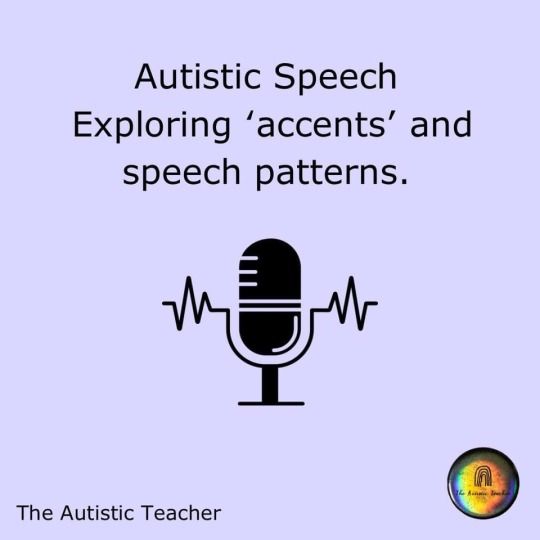
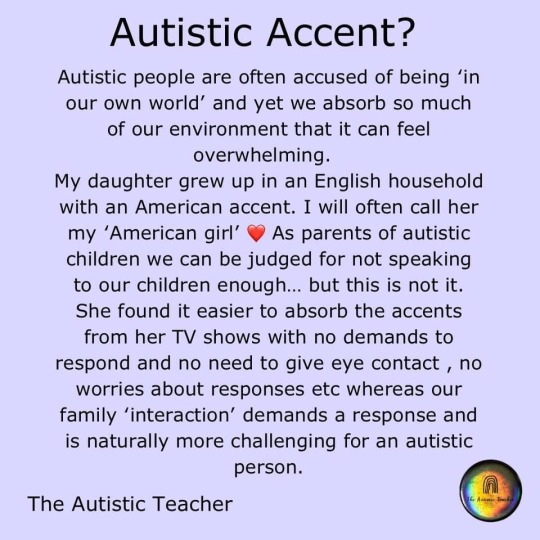
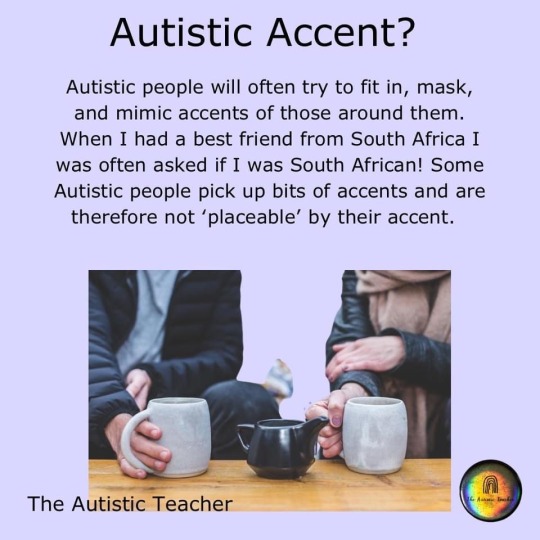
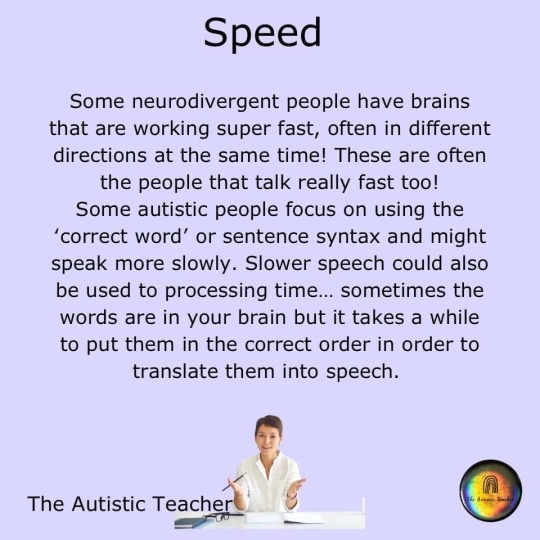

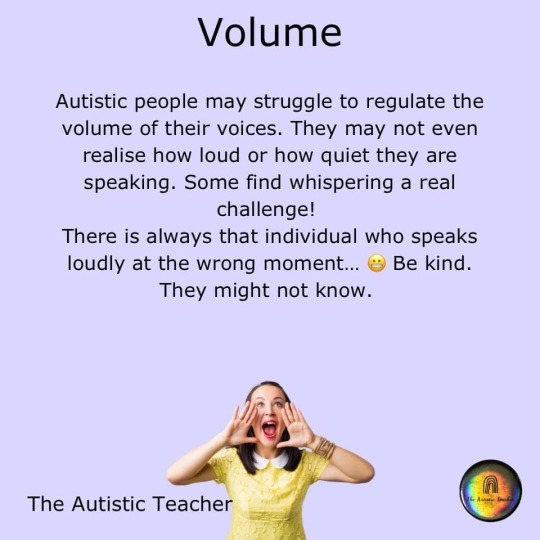
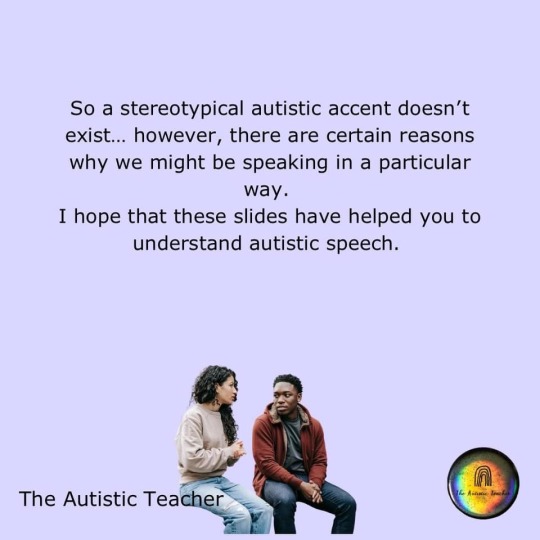
The Autistic Teacher
#autism#actually autistic#autism accents#autism and speech#social development#neurodivergence#neurodivergent#actually neurodivergent#feel free to reblog/share#The Autistic Teacher (Facebook)
459 notes
·
View notes
Text
On today's menu there is also HIM!!!




Colin when he's genuinely about to lose it be like:
#lil' doodle#da media#secret media 🎥#past our lessons au#colin the computer#dhmis colin#ooo I can't lie anymore I rlly like this fella for no reason#he's designed to be a boring aa and yet look at him#dhmis#don't hug me i'm scared#dhmis teachers#anyways I can't wait for the au to develop#Colin will be sassier at some point#(filter off basically)
64 notes
·
View notes
Text
sukugo is a crack ship TO YOU. to me it's a perfectly legitimate ship, held back within the canon universe principally due to adherence to classic genre structures and not by lack of character compatibility
#sukugo#not to be a crack ship definition purist. but it doesnt qualify as a crack ship if the characters are totally compatible#and if a major reason that the ship is not canon is just because the characters aren't main characters and thus not the focus of the story#what i mean is that jjk has a pretty normal structure for a coming of age martial arts story#it has the young protagonist who is the focus of the story#who has a wise teacher who is killed by the villain to provide the protagonist with more motivation to defeat the villain#gojo and sukuna were both doomed by the narrative in that the narrative followed this classic structure. so long as yuji is the protagonist#and main character then gojo needs to die to allow him growth and focus#and sukuna needs to be defeated by yuji#sukuna and gojo's relationship could only develop to a limited extent within their fight because its only setting the stage for the final#fight between yuji and sukuna#BUT THERE ARE ABSOLUTELY MANY EXCHANGES BETWEEN GOJO AND SUKUNA THAT DEMONSTRATE THAT THEY ARE COMPATIBLE AS A SHIP IF THEY HAD#TIME AND SPACE TO DEVELOP THE STORY IN THAT DIRECTION#“teacher and villain set up to be on opposing sides but finding understanding and an equal and love in each other” is totally legit dynamic#thats the premise of tian ya ke/word of honor#what im saying is that sukugo are very compatible as a ship#but to have a ship like sukugo be believable in canon. their relationship needs to be given time to develop#more time than jjk is able to give it within its structure without more genre subversion and without them being main characters#jjk
99 notes
·
View notes
Text


absolute guytora but tora is a suburban soccer mom who’s a member of the local HOA to match guy being a cop + gnort is a wiener dog. the horror!
#my art#dc comics#guy gardner#tora olafsdotter#gnort#guytora#cursed ahh post#want my full opinion on absolute guy? check my twitter!#the choice to give him the cop origin + reduce him to cannon fodder feels deliberate here and i don’t like that.#you have john as an architect and hal as a toy salesman… but guy’s a cop? not a teacher? really.#cosmic horror is also poorly developed and i just don’t care for the hal focus. mid book
86 notes
·
View notes